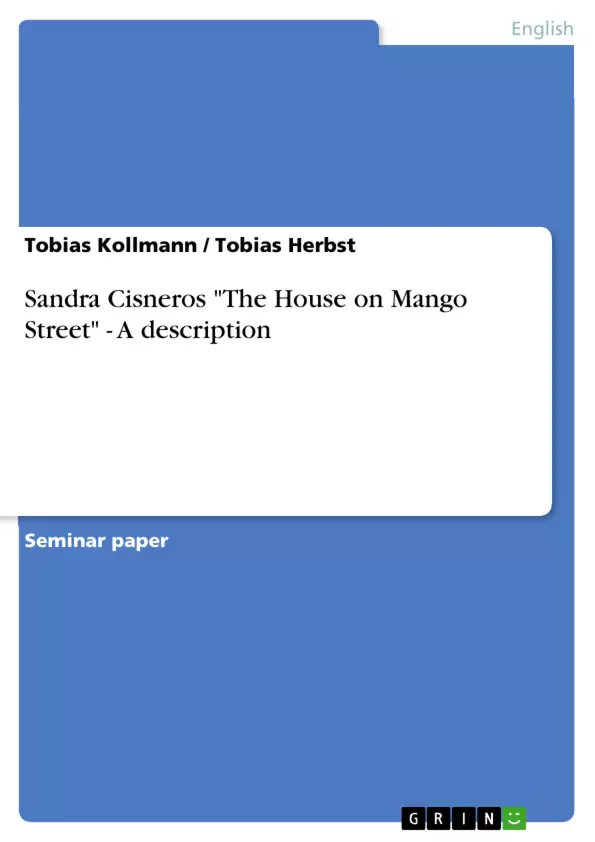Reading as an intellectual competence opens the way to explore culture and knowledge, to participate in cultural life and to enjoy literature. Culture and knowledge are parts of our education and are central to our ability to think critically on any topic. Studying literature plays a central role in developing these skills. According to Hesse (2002, p.50f.), there are some elementary goals of literacy teaching, such as (1) focussing on specific parts of the text, (2) the use of methods which support an active and productive reading behaviour, (3) a change of intensive and extensive phases of reading and (4) the relation to students’ interests.
Literature studies offer students opportunities to work on carefully chosen texts provided by the teacher. Results from the PISA studies of 15-year-old poor readers in Germany illustrate the importance of finding adequate literature for the EFL classroom. In our term paper, we want to examine how far Sandra Cisneros’ The House on Mango Street is relevant for the EFL class. The questions which chances and opportunities the novel bears and for which purpose its plot is useful to discuss different topics are in the centre of interest.
Therefore, the term paper shows didactical and methodological aspects, i.e. how the book relates to the curriculum as well as to the students’ lives, which learning strategies and social forms can be applied. Therefore, we have provided several tasks to be used in the EFL class which all bear a differentiated analysis. On the one hand, the tasks have a tendency towards creating a relationship between the text and its reader, on the other hand, they enlarge students’ abilities to use various learning strategies and methods.
We can draw the conclusion that "The House on Mango Street" provides numerous essential topics and aspects for teenagers and is, therefore, highly relevant for students in the EFL class. As the book consists of many short stories, it can be used either as a whole entity or partially, a fact which makes the novel attractive to teachers and students as well.
Table of Contents
- I. General Introduction
- II. Main Part: Class Activities
- a) Talk Show and Attitudes (Tobias Kollmann)
- b) Writing Circle (Tobias Herbst)
- c) Completing a Chapter (Tobias Herbst)
- d) Ideas and Mind Maps on “My Name” (Tobias Kollmann)
- e) Debate on Friendship (Tobias Herbst)
- f) Advising Sally (Tobias Kollmann)
- g) Vocabulary Training (Tobias Herbst)
- III. General Conclusion
- IV. References
Objectives and Key Themes
The purpose of this term paper is to examine the relevance of Sandra Cisneros' The House on Mango Street for the EFL classroom. It explores how the novel can be used to discuss various topics and develop students' skills in English.
- The connection between the author's background and the protagonist's experience in The House on Mango Street.
- Esperanza's journey of self-discovery and her dreams of escaping Mango Street.
- The exploration of themes like friendship, gender oppression, racism, culture, love, sexuality, and growing up in the novel.
- The potential for incorporating the novel into the EFL curriculum through practical tasks and activities.
- The effectiveness of The House on Mango Street in engaging EFL students and promoting their language learning.
Chapter Summaries
The paper delves into the specific themes and arguments present in different chapters of The House on Mango Street. It offers insights into Esperanza's perspective and the various social and personal issues she encounters.
The chapter "Beautiful & Cruel" is analyzed in detail, focusing on Esperanza's self-perception, her comparisons with others, and her resistance to traditional female roles. This chapter serves as a foundation for a classroom activity involving a role-playing talk show on "Women's Role", where students adopt different characters from Mango Street.
Keywords
The key themes and concepts explored in this term paper include the relationship between the author's background and the protagonist's experience, Esperanza's journey of self-discovery, the themes of friendship, gender oppression, racism, culture, love, sexuality, and growing up, and the application of the novel in the EFL classroom.
Frequently Asked Questions
Why is 'The House on Mango Street' relevant for EFL classes?
The novel addresses essential teenage topics such as identity, friendship, and cultural belonging, making it highly relatable and engaging for English as a Foreign Language (EFL) students.
What are the main themes explored in Sandra Cisneros' novel?
Key themes include gender oppression, racism, culture, love, sexuality, and the journey of growing up in a marginalized environment.
Who is the protagonist of the story?
The story follows Esperanza, a young girl living on Mango Street, as she dreams of escaping her surroundings and discovering her own identity.
How can the book be used in a classroom setting?
Because it consists of many short stories (vignettes), it can be used either as a complete work or in parts for specific activities like debates, talk shows, or creative writing circles.
What classroom activities are suggested for this novel?
Suggested activities include role-playing talk shows about women's roles, writing circles, debates on friendship, and vocabulary training related to the text.
- Quote paper
- Tobias Kollmann (Author), Tobias Herbst (Author), 2005, Sandra Cisneros "The House on Mango Street" - A description, Munich, GRIN Verlag, https://www.grin.com/document/41910



